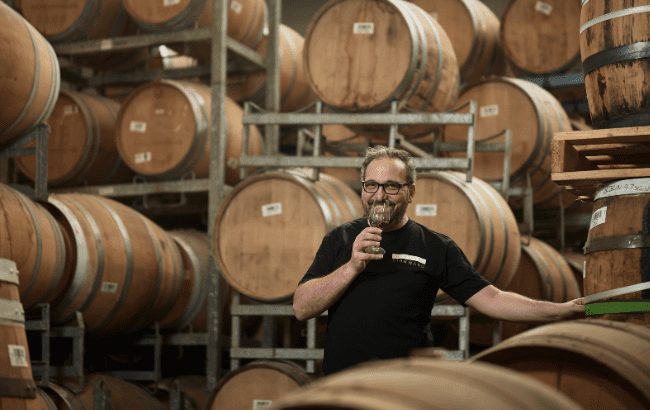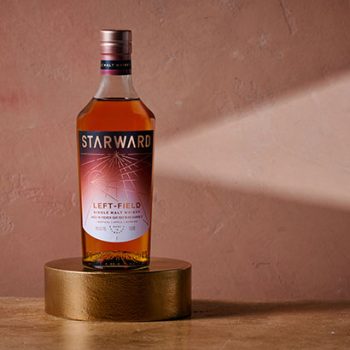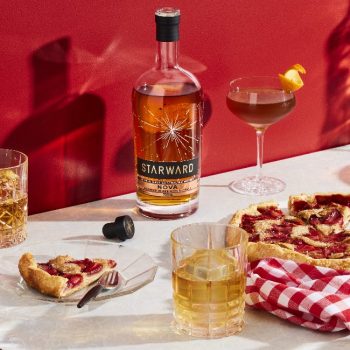Is Australian whisky the most provincial category on the shelf?
By Rupert HohwielerDave Vitale, founder of Starward, tells us how Australian whisky can reach top status on the shelves of its home market – and possibly beyond.

With global Scotch exports in decline, Vitale believes there’s an opportunity for Australia in the whisky market, particularly at home.
Speaking to The Spirits Business on domestic whisky demand, he explains: “Starward is still growing in Australia, and growing quite rapidly, but the whisky category, particularly over AU$50 (US$33), is pretty flat here. What we’re seeing is a huge decline in Scotch, and Bourbons and whiskies from America are really starting to appeal to drinkers.”
Vitale feels brands such as his own can fill a spot as people transition from Scotch to Bourbon, or even trade up from mainstream Bourbon. “Starward is a real beneficiary of that transition that’s going on in the marketplace,” he says. “My job is just to wave and say ‘hi, if you’re thinking about a change, you should give us a go’.”
While Scotch sales might be down and Starward is trending up, Vitale notes that it’s not a one-for-one situation. “Most of it is going to American whiskey, but we’re there,” he says. “When you think about American whiskey drinkers in their 40s and 50s, they were drinking a lot of Scotch, Irish and Canadian whisky, and now it’s predominantly American whiskey, right? So that gets me really excited – what if we could make that a reality for Australian whisky? What if we could be the number-one whisky category on the shelf in Australia, like by volume and value? I think it’s entirely possible.”
Looking at the vibrancy and innovation of Australia’s whisky scene, he believes there is a real opportunity over the next 12 to 18 months to win at home. “We can really cement ourselves as part of the mainstream Australian consideration set, and then take those wins and parlay them into international success.”
Spirits trade body as a catalyst
To get Australian whisky and spirits to where they can to be, Vitale stresses the need for a trade body similar to the one the country has for wine.
The creation of such a body was recommended at a parliamentary inquiry earlier this year. “It’s still not there yet, but I think that’s going to be a linchpin in terms of both domestic and international scale for the Australian spirits category,” Vitale says. “It was the catalyst for what we see today with Australian wines.”
Vitale says that support from a trade body could also go long way for all Australian spirits brands, not just for Starward, enabling them to represent Australia on world stage at global trade shows and events.

“You often see it when you go to a ProWein, or an international spirits or beverage/alcohol conference, pavilions with countries advocating for their wines, or their spirits and things of that nature. At the moment, it’s individual brands like Starward that need to fund that themselves, so it’s really difficult as a category of one to build a category internationally. Having a ‘Spirits Australia’ gives every spirits producer the opportunity to have a platform on the world stage to advocate for the quality and the provinance and the flavour that we’re able to export.”
‘Business as usual’
Diageo currently holds a 30% minority stake in Starward, and Vitale confirms the brand still has a strong relationship with the drinks giant, despite it backing out of its Distill Venture’s accelerator programme earlier in the year.
Vitale notes the relationship with Diageo has enabled it to strengthen Australia’s credentials as a spirit force: “That’s that opportunity and it shows how large multinationals see us as a place, both domestically but also internationally.”
Vitale says that the relationship with Diageo is “business as usual for the time being. We’ve been really fortunate to have a long-standing relationship with Diageo, and their support has been instrumental in us getting to where we are. I’m really grateful for that. What the future holds, we’ll have to wait and see. But at this point in time, they’ve been great supporters of the brand.”
A compelling proposition
At present, Australia has the third highest excise rate for spirits in the world, a rate that rises twice a year – and it isn’t going away anytime soon, which Vitale is well aware of, acknowledging that its can’t be ignored, but for now, he’d rather look to the future.
“I think that’s a conversation that when we engage with the government gets them thinking: ‘all right, well, this isn’t just a handout. It is about reinvesting in the industry to scale it up’. That’s the mindset that we want to have when we talk about excise relief or investing in a Spirits Australia.”
Speaking of the appetite in Australia to drink Australian spirits, he adds: “We’ve got a compelling proposition that drinkers are excited by, and I’m not just talking about Starward, because I think that there’s a real reason to exist.”
For whisky, Australian makers have more room to experiment than their international contemporaries, as they are not bound by the same regulations imposed on Scottish and Irish producers.

For example, Starward has recently relaunched the eighth version of its ginger beer cask-finished whisky. “That would not be allowed to be called Scotch in Scotland,” Vitale says, “because ginger is a predominant flavour, which isn’t part of the repertoire of Scotch whisky flavour profiles.
“I think in this pursuit of flavours, we’re seeing people get really excited by more diverse ranges of flavour, not just in whisky, but in drinks. That’s quite exciting because particularly as a whisky maker, I get really excited at picking a whisky as an ingredient in a drink as much as I do having it as a drink. I get excited by that because it gives Starward a reason to exist as a modern whisky, where perhaps with a Bourbon or a Scotch, people feel a bit apprehensive about picking it as an ingredient.”
There’s also Starward’s Nova expression, aged in Australian red wine casks. “We put our whisky in Australian wine barrels, ” he says. “Don’t say this in Glasgow, but Starward is more Australian than Scotch is Scottish, in a way. We’re using Australian red wine barrels to age our whisky when Scotland imports barrels from Portugal, Spain and America, to age their whiskies. It’s the same with Japan. We are probably the most provincial whisky category on the shelf – and that’s a really exciting thing to talk about.”
The biggest challenges for Vitale going forward are the country’s excise duties, and the lacking in general awareness of Australian spirits.
“We are by far away the leading whisky on the shelf [when it comes to] awareness of Australian whisky, but Starward is still quite low among whisky drinkers. We face this unique challenge with spirits, unlike in craft beer where you could quite compellingly argue that institutional beer was broken.
“What’s broken in spirits? I think that the mainstream whiskies and gins and all those sorts of things are really well-crafted excellent products, and so the job of an Australian spirit is to be really interesting and compelling to drinkers, and getting them to move from something that’s great to another thing that’s great, but with just something more identifiable to them.”
“We’re just an alternative, but with a different worldview and a different way of approaching the market that makes us exciting.”
Related news
Australian rum maker Brix Distillers files for administration
